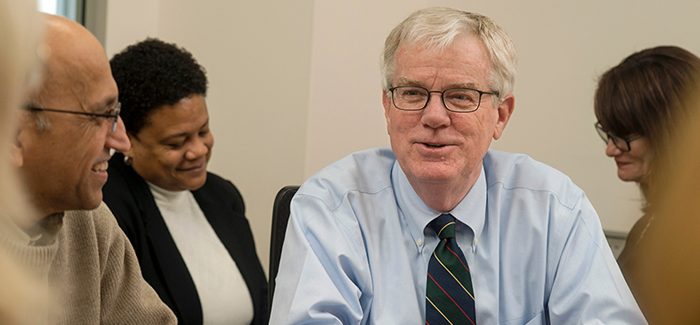
“It is a struggle to find commitments to values” in business, Tropp says. (Photography by Lloyd Degrane)
A Divinity School alumnus keeps ethical conduct front and center at his company.
Can corporations hold themselves to high ethical standards and still make a profit? Tom Tropp thinks so. Tropp, AM’07, is vice president for corporate ethics and sustainability at Arthur J. Gallagher & Co., an insurance brokerage and risk management firm based in the Chicago suburb of Itasca. Ethics have been a growing concern for American corporations since the 1960s. A powerful impetus came in the 1980s, when fraud and mismanagement of Pentagon contracts led to new federal sentencing guidelines for corporate crime. These offered leniency to companies that could demonstrate a commitment to ethical standards, and today most Fortune 500 companies have codes of conduct and employ executives to promote ethics. Many business schools, including Chicago Booth, offer courses in business ethics.
Still, a 2012 Gallup poll found that the American public ranked business executives low in honesty and ethical standards—higher than members of Congress but far below nurses and lower even than journalists and bankers. Experts on business ethics say that whether companies really take ethics seriously depends on the commitment of senior executives. “It’s very easy to create a code of conduct,” says Patricia Harned, president of the Ethics Resource Center in Arlington, Virginia. “It’s very difficult to create an environment where people accept it and live by it and not assume it’s just a PR effort by the company.”
Tropp’s job is to help his company live up to its principles. Gallagher—started in 1927 and run today by the founder’s grandson—has had a code of conduct since 1984, when the company went public and then-CEO Robert Gallagher drew up a list of 25 principles he called “The Gallagher Way.” Meant to regulate one’s professional conduct, they are displayed in every Gallagher office and accompany all important communications. Some are little more than business cheerleading, like “We’re a very competitive and aggressive Company,” but others are more surprising, such as “Empathy for the other person is not a weakness.”
Tropp also oversees Gallagher’s charitable giving, but the core of his job is the more than 100 annual visits he makes to promote the Gallagher Way to the company’s 13,000-plus employees around the world. On the visits, he discusses the company’s values and tells stories from the field—often uplifting ones like how one Gallagher worker donated a kidney to a worker in a different state. Then he starts an open discussion by asking “What are we doing well?” and “What are we doing poorly?” He usually lingers afterward to speak with employees who want to discuss their concerns privately. No subject is off limits.
Most employee concerns have little to do with ethics—one of the most frequent is “Why didn’t I get a raise?”—but some do. Tropp could not discuss many of them for reasons of confidentiality, but one common issue that arises is what to do when local cultural values conflict with the company’s values. For example, Gallagher forbids “accommodation payments” in exchange for favorable treatment. Employees in countries where the practice is pervasive (such as Brazil, where new antibribery legislation takes effect this year) complain that they are “not a on a level playing field with the competition,” Tropp says. His quick response is, “Stick to your values.” But employees want to know, how do we do business? “Our answer,” Tropp says, “is that the benefits of being with a highly ethical company will outweigh the disadvantages in the long run.” It’s a question of faith.
Tropp grew up in Chicago and attended Catholic schools. After graduating from Loras, a Catholic college in Iowa, he taught speech, English, and drama at Chicago’s Mother McAuley High School. With three children, he needed a better-paying job and began selling insurance. By 2002 his son Daniel was practically running Tropp’s business. Tropp, in his mid-50s and looking for a change, decided to study theology.
While in school at UChicago he became fascinated by ethics; he could see all sorts of applications to business. One of his teachers, Shailer Mathews distinguished service professor emeritus Franklin Gamwell, AM’70, PhD’73, observed that he kept the practical world of business in his “peripheral vision.” In 2007 Tropp graduated and sold his business, with its 12 employees, to Gallagher. Within six months he began his site visits, and two years after that he became the company’s ethics officer.
Tropp says the philosopher John Rawls in particular has shaped his thinking about business ethics. When Rawls writes about how members of a pluralistic society search for mutually agreeable rules to live by, Tropp thinks of a company. Ethical companies work better internally, he says. They are quicker to acknowledge mistakes and make adjustments, better organized, and more transparent.
John Paul Rollert, AM’09, an adjunct professor at Chicago Booth and an expert on business ethics, says people not only prefer to do business with ethical companies, they also want to work at them. For the young business students in his classes, he says, ethical conduct means not just treating employees well but showing concern for the company’s effect in the world. Adding to the trend, modern information technology is making it much harder for companies to hide misbehavior.
Yet, Tropp says, “It is a struggle to find commitments to values.” Most companies offer only vague assurances, and most have lawyers, who lean heavily toward legal compliance, instead of ethics officers. In fact, he often meets with skepticism when he talks to other business people about ethics. The stress on empathy, a key part of the Gallagher Way, troubles them most. To many, empathy in business is a weakness, not a strength. “People say, ‘Yes, but this is business, so the rules are different,’” Tropp says. “Wrong. The rules should be the same.”
